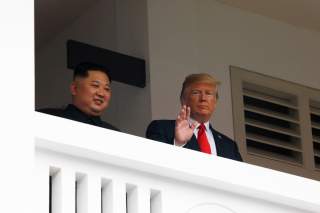The Hanoi Summit – We Asked Joe Cirincione What Happens Next in U.S.-North Korea Relations
"The best hope for course correction is an engaged public and Congress."
Editor’s Note: Looking for more opinions on where we go after the Hanoi summit? Check out all 80 expert takes on where U.S-North Korea relations go next here.
John Bolton appears to have locked the U.S. administration into a policy death spiral. His Sunday, March 10 talk show declaration that North Korea must entirely surrender its nuclear, biological and chemical weapons programs before any significant U.S. moves towards sanctions relief or peace is a fantasy. We can call this the Unobtainium Strategy.
Bolton explicitly rejects the “action for action” plan that Stephen Biegun had favored prior to the Hanoi Summit. Biegun appears to have capitulated to Bolton, telling reporters at a March 7 State Department briefing that “Nobody in the administration advocates a step-by-step approach.”
There is zero chance that North Korea will agree. In Hanoi, North Korea wanted to trade some of their nuclear capability for most of the sanctions. Trump offered some of the sanctions for most of their nuclear capability. There was a deal to be made, but Trump proved too incompetent to make it.
Bolton has now raised the demand to all of everything before the United States does anything. Having convinced Trump to “go big,” likely knowing it would fail, he sabotaged an already difficult summit, popularized the myth that the failure of past agreements was entirely the fault of North Korea, and set U.S. policy on auto-destruct. Sanctions and military threats will not force Pyongyang to collapse or comply. Instead, this will lead to either acceptance of their nuclear status or war.
The best hope for course correction is an engaged public and Congress. Public demands for a better policy will likely grow as Trump’s failure deteriorates into military signaling (see North Korea’s recent launch site activity) and increased war fears.
Congress might be receptive. There is a possibility that Republicans and Democrats could cooperate. Republicans may not want to see another foreign policy disaster drag down the administration and their party. Democrats should not want the next president to inherit this mess, knowing it will be even harder for a Democratic president to negotiate a deal. This will particularly be the case when some Republicans predictably turn against a diplomatic process they only favored because Trump wanted it.
Our role as experts must be to provide a more balanced analysis of the blame both sides share for past failures, explanations of why step-by-step diplomacy is more realistic than all-or-nothing. The role of experts should also be to provide a greater appreciation for the views of our ally, South Korea, and its public’s desire for peace and disarmament. South Koreans don’t want to risk war for a fantasy. Neither should we.
Joe Cirincione is the President of the Ploughshares Fund.
Image: Reuters

